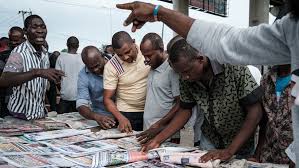The report that the Nigerian currency, the naira depreciated in its value against the United States dollar to N1,234 at the official foreign exchange market on Monday dominates the headlines of Nigerian newspapers on Tuesday.
The Punch reports that the naira depreciated in its value against the United States dollar to N1,234 at the official foreign exchange market on Monday, according to data obtained from the FMDQ securities exchange.
The exchange rate means the naira fell by N65 or 5.26 per cent from N1,169.99/$1 recorded on Friday.
The local currency had strengthened to around N1,072.74 on Wednesday as traders projected the naira could trade below N1,000/$1 for the first time.
However, the latest drop appears to coincide with the remarks of the apex bank Governor, Yemi Cardoso, who stated that the intent of the bank was not to defend the Naira, when asked about the sudden drop in external reserves.
Nigeria’s foreign exchange reserves have maintained a one-month dip streak. The latest figures from the Central Bank of Nigeria show the external reserves reached a new low of $32.1bn on April 18, 2024. The reserves dropped by $2.35bn in 31 days, from $34.45bn on March 18, 2024.
But the CBN governor at the International Monetary Fund/World Bank Spring Meetings stated that the bank would refrain from intervening in the exchange unless unusual circumstances arose, stressing that the recent slight shift in reserves was unrelated to defending the naira.
He said, “I want to make this as clear as possible, it is not in our intention to defend the naira. and as much I have read in the recent few days, some opinions with respect to what is happening with our reserves and if the central bank is defending the naira.”
The newspaper says that the Inspector-General of Police, Kayode Egbetokun, has rejected the state police proposal, warning that the governors can abuse the outfit for political or personal gains and compromise human rights and national security.
The IG stated this at the national dialogue on state policing organised by the House of Representatives in Abuja, on Monday, with the theme, ‘Pathways to Peace: Reimagining Policing in Nigeria.’
However, the Federal Government insisted there was no going back on the initiative.
At the event, Vice President Kashim Shetimma reiterated the Bola Tinubu administration’s commitment to creating an enabling environment for the establishment of state police across the country.
The nation has been grappling with multifaceted security challenges for the past years with the police authorities unable to roll back the crisis despite the deployment of various strategies, including the military forces across the country.
To address the anomaly, Tinubu and the state governors agreed to come up with modalities that would culminate in the creation of state police to tackle the security crisis.
This was part of the agreements reached at an emergency meeting between the President and 36 state governors at the Aso Rock Villa, Abuja in February.
The Vanguard reports that the Civil Society Organizations (CSOs) in Nigeria have called on President Bola Tinubu to investigate the proliferation of arms in the Niger Delta region.
The CSOs, under the umbrella of the Civil Society Organization Network of Nigeria (CSONN), made the call during a mass demonstration at the NNPC headquarters in Abuja on Monday.
According to CSONN, the proliferation of arms in the region has led to an increase in violent crimes, including kidnapping, armed robbery, and cultism.
The group expressed concern that the situation could further deteriorate if not addressed promptly.
“We urge President Tinubu to investigate the sources of these arms and take decisive action to stem the tide of arms proliferation in the Niger Delta,” said Collins Eshiofeh, Chairman of CSONN.
The group also called on the government to review the award of pipeline surveillance contracts to former militants, citing concerns that these contracts could be used to further arm and empower these individuals.
“The government must ensure that those entrusted with national assets do not have a history of militant activity or arms proliferation,” Eshiofeh added.
The CSOs highlighted the recent efforts by the Nigerian Navy and President Tinubu in curbing oil theft.
However, they pointed out the urgent need for a review of the current pipeline surveillance contracts, which they believe could exacerbate the environmental and security crises in local communities.
The newspaper says that the Federal Government said it would soon commence the loan disbursement process for micro, small and medium enterprises (MSME) and manufacturing sectors under the Presidential N200 billion Intervention Fund scheme.
Recall that President Bola Tinubu launched the scheme on October 17, 2023, to cushion the effects of the removal of petrol subsidy and other economic shocks.
Announcing the disbursement of the funds, Minister of Industry, Trade and Investment, Doris Uzoka-Anite, in a statement yesterday, noted that the decision was taken following the success of the ongoing disbursements targeted at supporting one million nano businesses across the country.
According to her, N75 billion each has been allocated to support MSMEs and the manufacturing sector under the Presidential Intervention Fund. This is in addition to the N50 billion set aside to support the nano businesses.
Uzoka-Anite stated: “The Federal Government of Nigeria is proud to announce the operational launch of the MSME and Manufacturing segment under the prestigious Presidential N200 Billion Intervention Fund.
“With applications for the Presidential Conditional Grant Scheme now closed, we are excited to move forward with the loan disbursement process for the MSME and manufacturing sectors, aimed at boosting economic growth and industrial development.
“This fund is strategically divided, dedicating N75 billion to MSMEs and another N75 billion to the manufacturing sector.”
GIK/APA
Nigeria: Press focuses on drop in value of Naira at official market, others

Previous ArticleSouth African police bust Colombian cocaine-smuggling ring

